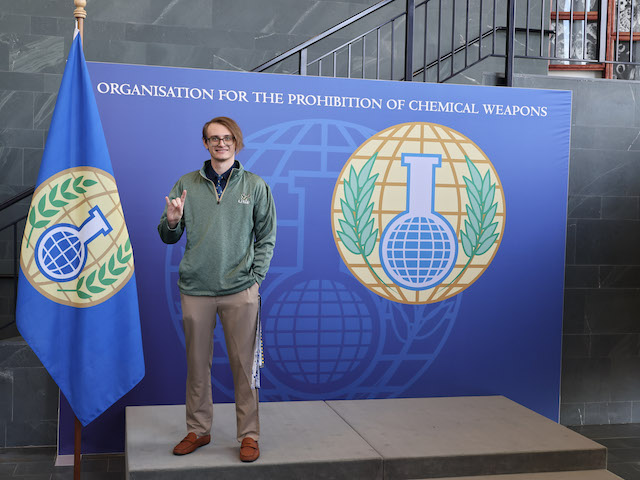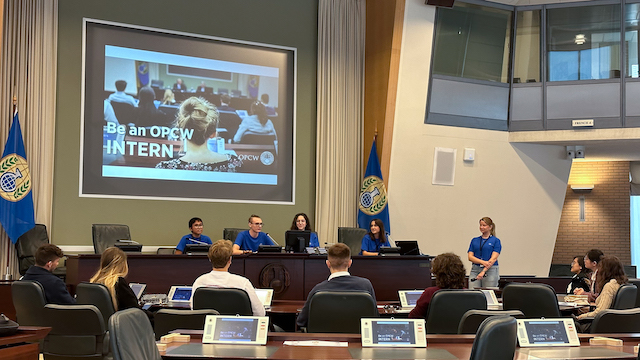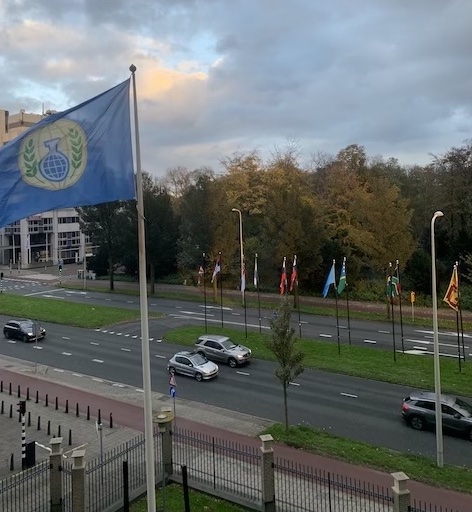MPH student completes internship at the Hague, works to end use of chemical weapons
Nicholas Cropper, a USF College of Public Health MPH student, recently returned from the Netherlands after completing a six-month internship with the Organisation for the Prohibition of Chemical Weapons (OPCW), housed in the Hague.

OPCW is the implementing body for the Chemical Weapons Convention (CWC), an agreement signed by 193 state parties to end the development, production, stockpiling, exchange and use of chemical weapons of mass destruction.
Cropper, who’s concentrating in global disaster management, humanitarian relief and homeland security, interned in the OPCW’s Office of Strategy and Policy, supporting the work of the Scientific Advisory Board (SAB) and their report for the upcoming review conference of the CWC.
Cropper said he performed a variety of functions, from writing small sections of the report to providing literature and resource support to editing.
“In addition to my responsibilities for the SAB,” he added, “I was also in charge of organizing public-facing events that my office put on, such as an educational activity for OPCW’s Open Day where we invited the public into OPCW’s headquarters to learn what we do, or our Science for Diplomats event that was held at the most recent Conference of States Parties where we provided a basic hands-on chemistry lesson for attending diplomats.”

Learning to collaborate with such a culturally and professionally diverse group of individuals was the internship’s biggest benefit—and challenge—according to Cropper.
“I worked on projects with people from all over the world, and it was really transformative to see the incredible diversity of thinking, even within geographic regions,” Cropper noted. “I also worked with people whose professional backgrounds were wildly different from my own, from public relations professionals to PhD chemists to digital artists and just about everyone in between.”
Another added benefit of the internship, said Cropper, was how it broadened his conception of what constitutes a public health professional.
“For example, the public affairs professionals I collaborated with made information about why and how OPCW’s work contributes to a safer and healthier world more accessible to the public,” Cropper said. “And the diplomats I met were increasingly looking to include diverse and underrepresented viewpoints as they crafted and negotiated stronger governance structures that influence public health policy from the top down. I could go on, but the key point is that this experience has made me a better public health professional by widening my idea of what public health is, who plays a role in improving public health and how I can include an even broader diversity of backgrounds when putting together coalitions to advance public health initiatives in the future.”
Cropper said working at the Hague was “the privilege of a lifetime.”

“I frequently tell friends and family that I couldn’t have found a friendlier place for an American in Europe,” commented Cropper, who’s not sure about his post-graduation plans but is exploring opportunities with the U.S. State, Defense and even Energy Departments. “The city is absolutely gorgeous, the people are some of the friendliest I’ve ever met and it’s no more expensive than any other major European city! The internship at OPCW has been a transformative experience in so many ways. I highly recommend it to other scientifically or internationally-minded students at USF!”
Story by Donna Campisano, USF College of Public Health
